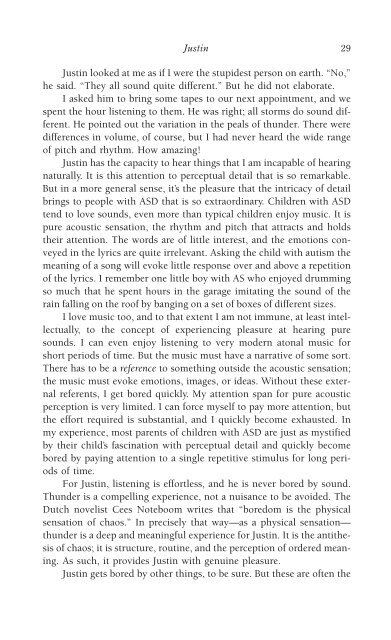978-1572305441
autism
autism
You also want an ePaper? Increase the reach of your titles
YUMPU automatically turns print PDFs into web optimized ePapers that Google loves.
Justin 29<br />
Justin looked at me as if I were the stupidest person on earth. “No,”<br />
he said. “They all sound quite different.” But he did not elaborate.<br />
I asked him to bring some tapes to our next appointment, and we<br />
spent the hour listening to them. He was right; all storms do sound different.<br />
He pointed out the variation in the peals of thunder. There were<br />
differences in volume, of course, but I had never heard the wide range<br />
of pitch and rhythm. How amazing!<br />
Justin has the capacity to hear things that I am incapable of hearing<br />
naturally. It is this attention to perceptual detail that is so remarkable.<br />
But in a more general sense, it’s the pleasure that the intricacy of detail<br />
brings to people with ASD that is so extraordinary. Children with ASD<br />
tend to love sounds, even more than typical children enjoy music. It is<br />
pure acoustic sensation, the rhythm and pitch that attracts and holds<br />
their attention. The words are of little interest, and the emotions conveyed<br />
in the lyrics are quite irrelevant. Asking the child with autism the<br />
meaning of a song will evoke little response over and above a repetition<br />
of the lyrics. I remember one little boy with AS who enjoyed drumming<br />
so much that he spent hours in the garage imitating the sound of the<br />
rain falling on the roof by banging on a set of boxes of different sizes.<br />
I love music too, and to that extent I am not immune, at least intellectually,<br />
to the concept of experiencing pleasure at hearing pure<br />
sounds. I can even enjoy listening to very modern atonal music for<br />
short periods of time. But the music must have a narrative of some sort.<br />
There has to be a reference to something outside the acoustic sensation;<br />
the music must evoke emotions, images, or ideas. Without these external<br />
referents, I get bored quickly. My attention span for pure acoustic<br />
perception is very limited. I can force myself to pay more attention, but<br />
the effort required is substantial, and I quickly become exhausted. In<br />
my experience, most parents of children with ASD are just as mystified<br />
by their child’s fascination with perceptual detail and quickly become<br />
bored by paying attention to a single repetitive stimulus for long periods<br />
of time.<br />
For Justin, listening is effortless, and he is never bored by sound.<br />
Thunder is a compelling experience, not a nuisance to be avoided. The<br />
Dutch novelist Cees Noteboom writes that “boredom is the physical<br />
sensation of chaos.” In precisely that way—as a physical sensation—<br />
thunder is a deep and meaningful experience for Justin. It is the antithesis<br />
of chaos; it is structure, routine, and the perception of ordered meaning.<br />
As such, it provides Justin with genuine pleasure.<br />
Justin gets bored by other things, to be sure. But these are often the



